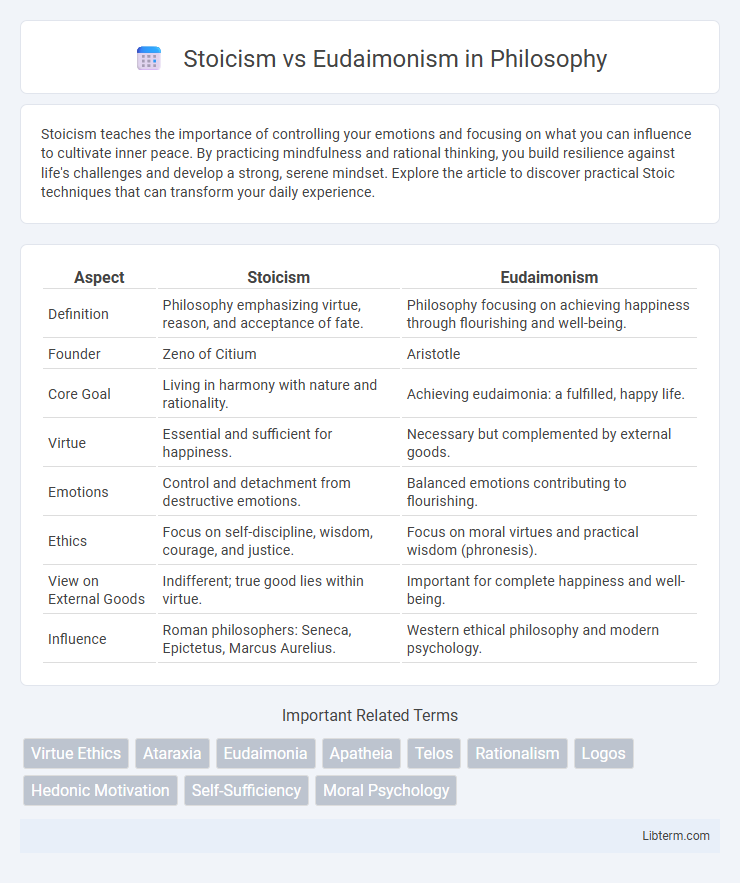Stoicism teaches the importance of controlling your emotions and focusing on what you can influence to cultivate inner peace. By practicing mindfulness and rational thinking, you build resilience against life's challenges and develop a strong, serene mindset. Explore the article to discover practical Stoic techniques that can transform your daily experience.
Table of Comparison
| Aspect | Stoicism | Eudaimonism |
|---|---|---|
| Definition | Philosophy emphasizing virtue, reason, and acceptance of fate. | Philosophy focusing on achieving happiness through flourishing and well-being. |
| Founder | Zeno of Citium | Aristotle |
| Core Goal | Living in harmony with nature and rationality. | Achieving eudaimonia: a fulfilled, happy life. |
| Virtue | Essential and sufficient for happiness. | Necessary but complemented by external goods. |
| Emotions | Control and detachment from destructive emotions. | Balanced emotions contributing to flourishing. |
| Ethics | Focus on self-discipline, wisdom, courage, and justice. | Focus on moral virtues and practical wisdom (phronesis). |
| View on External Goods | Indifferent; true good lies within virtue. | Important for complete happiness and well-being. |
| Influence | Roman philosophers: Seneca, Epictetus, Marcus Aurelius. | Western ethical philosophy and modern psychology. |
Introduction to Stoicism and Eudaimonism
Stoicism emphasizes living in accordance with reason and virtue, focusing on internal control over emotions to achieve tranquility, while Eudaimonism centers on attaining human flourishing through the fulfillment of one's potential and virtues. Both philosophies address the pursuit of the good life, yet Stoicism advocates acceptance of fate and self-discipline, whereas Eudaimonism highlights the development of well-being through meaningful activities and happiness. Understanding their foundational principles reveals distinct approaches to ethics and personal fulfillment rooted in ancient Greek philosophy.
Historical Origins and Key Figures
Stoicism originated in Athens around the 3rd century BCE, founded by Zeno of Citium, emphasizing virtue as the highest good and aligning with nature's rational order. Eudaimonism, rooted in Aristotelian ethics from the 4th century BCE, centers on achieving eudaimonia, or flourishing, through the cultivation of virtue and practical wisdom. Key figures in Stoicism include Epictetus, Seneca, and Marcus Aurelius, while Aristotle stands as the primary architect of Eudaimonism.
Core Philosophical Principles
Stoicism emphasizes living in accordance with nature and reason, advocating for virtue as the highest good while promoting emotional resilience through indifference to external circumstances. Eudaimonism centers on achieving eudaimonia, often interpreted as flourishing or well-being, by actualizing one's potential and living a life of moral and intellectual virtue. Both philosophies value virtue but differ in their approach to emotions and the ultimate purpose of life.
Views on Happiness and the Good Life
Stoicism defines happiness as living in accordance with nature and reason, emphasizing virtue as the sole good and tranquility achieved through acceptance of fate. Eudaimonism, rooted in Aristotelian philosophy, views happiness (eudaimonia) as flourishing through the fulfillment of one's potential and the practice of virtues within a community. Both philosophies prioritize virtue but differ as Stoicism stresses inner resilience and detachment, while Eudaimonism integrates external goods and social relationships into the conception of the good life.
Ethics and Moral Virtue Compared
Stoicism emphasizes virtue as living in accordance with nature and reason, focusing on internal control and resilience to external circumstances. Eudaimonism, rooted in Aristotelian ethics, defines moral virtue as a means to achieve eudaimonia, or human flourishing, through balanced character and practical wisdom. Both philosophies prioritize ethical behavior but differ in the ultimate goal: Stoicism seeks tranquility through acceptance, while Eudaimonism aims for fulfillment via virtuous activity.
Approaches to Emotion and Rationality
Stoicism emphasizes mastery over emotions through rational control, promoting apatheia--a state of being free from destructive passions--by aligning one's will with nature and reason. Eudaimonism centers on achieving a flourishing life by cultivating virtuous emotions and practical wisdom, viewing emotions as integral to moral development and well-being. Both philosophies value rationality but differ in that Stoicism seeks emotional detachment, while Eudaimonism advocates harmonious emotional engagement for true happiness.
Nature, Fate, and Human Agency
Stoicism emphasizes living in accordance with Nature, viewing Fate as a deterministic force guiding the cosmos, while human agency lies in accepting and aligning one's will with this natural order. Eudaimonism centers on achieving human flourishing through rational activity and virtue, asserting that individuals possess the capacity to shape their own destiny by making choices that fulfill their essential nature. Both philosophies stress harmony with Nature but differ on the extent of control humans have over their fate and the role of personal agency in attaining the good life.
Practical Applications in Modern Life
Stoicism emphasizes resilience through controlling emotions and accepting events beyond one's control, making it practical for managing stress and uncertainty in modern life. Eudaimonism centers on flourishing by cultivating virtues and pursuing meaningful goals, guiding individuals toward personal growth and long-term fulfillment. Applying Stoic techniques enhances emotional stability while Eudaimonic principles encourage purposeful living and well-being.
Criticisms and Limitations
Stoicism faces criticism for its emphasis on emotional suppression, which some argue can lead to detachment from reality and neglect of personal desires, while Eudaimonism's focus on achieving flourishing through virtue is challenged for its subjective interpretation of what constitutes a "good life." Stoicism is often seen as rigid, promoting acceptance of suffering without addressing social injustice, whereas Eudaimonism may overlook external factors influencing well-being, such as socioeconomic conditions. Both philosophies struggle to provide practical guidance for diverse cultural contexts, limiting their universal applicability in modern ethical frameworks.
Conclusion: Choosing Between Stoicism and Eudaimonism
Choosing between Stoicism and Eudaimonism depends on whether one values virtue-based resilience or flourishing through personal fulfillment. Stoicism emphasizes emotional control and living in harmony with nature's rational order, while Eudaimonism focuses on achieving happiness through the realization of one's potential and moral excellence. Both philosophies offer profound insights into a well-lived life, with Stoicism providing practical tools for adversity and Eudaimonism encouraging a broader pursuit of happiness and growth.
Stoicism Infographic

 libterm.com
libterm.com